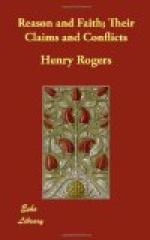Peculiarities of the Christian Religion’) to
the perusal of our readers, and at the same time venture
to express our conviction (having been led by the circumstances
above mentioned to a fuller acquaintance with his
Grace’s theological writings than we had previously
possessed) that, though this lucid and eloquent writer
may, for obvious reasons, be most widely known by his
’Logic and ‘Rhetoric,’ the time
will come when his Theological works will be, if not
more widely read, still more highly prized. To
great powers of argument and illustration, and delightful
transparency of diction and style, he adds a higher
quality still—and a very rare quality it
is—an evident and intense honesty of purpose,
an absorbing desire to arrive at the exact truth,
and to state it with perfect fairness and with the
just limitations. Without pretending to agree
with all that Archbishop Whately has written on the
subject of theology (though be carries his readers
with him as frequently as any writer with whom we are
acquainted) we may remark that in relation to that
whole class of subjects, to which the present essay
has reference, we know of no writer of the present
day whose contributions are more numerous or more
valuable. The highly ingenious ironical brochure,
entitled ’Historic Doubts relative to Napoleon
Buonaparte;’ the Essays above mentioned, ’On
some of the Peculiarities of the Christian Religion;’
those ’On some of the Dangers to Christian Faith,’
and on the ‘Errors of Romanism;’ the work
on the ‘Kingdom of Christ,’ not to mention
others, are well worthy of universal perusal.
They abound in views both original and just, stated
with all the author’s aptness of illustration
and transparency of language. We may remark,
too, that in many of his occasional sermons, he has
incidentally added many most beautiful fragments to
that ever accumulating mass of internal evidence which
the Scriptures themselves supply in their very structure,
and which is evolved by diligent investigation of
the relation and coherence of one part of them with
another. We are also rejoiced to see that a small
and unpretending, but very powerful, little tract,
by the same writer, entitled ’Introductory Lessons
on Christian Evidences.’ has passed through many
editions, has been translated into most of the European
languages, and, amongst the rest, very recently into
German, with an appropriate preface, by professor
Abeltzhauser, of the University of Dublin. It
shows to demonstration that as much of the evidence
of Christianity as is necessary for conviction may
be made perfectly clear to the meanest capacity’
and that, in spite of the assertions of Rome and of
Oxford to the contrary, the apostolic injunction to
every Christian to be ready to render a reason ’for
the hope that is in him,’—somewhat
better than that no reason of the Hindoo or the Hottentot,
that he believes what he is told, without any reason
except that he is told it,—is an injunction
possible to obey. ____




